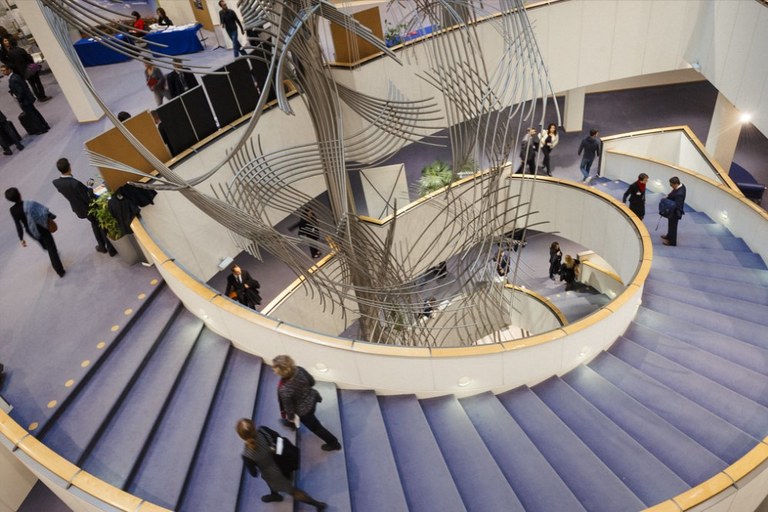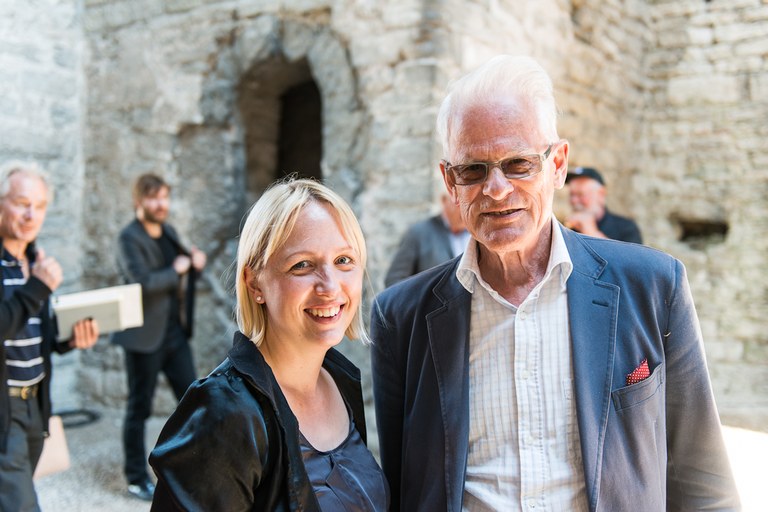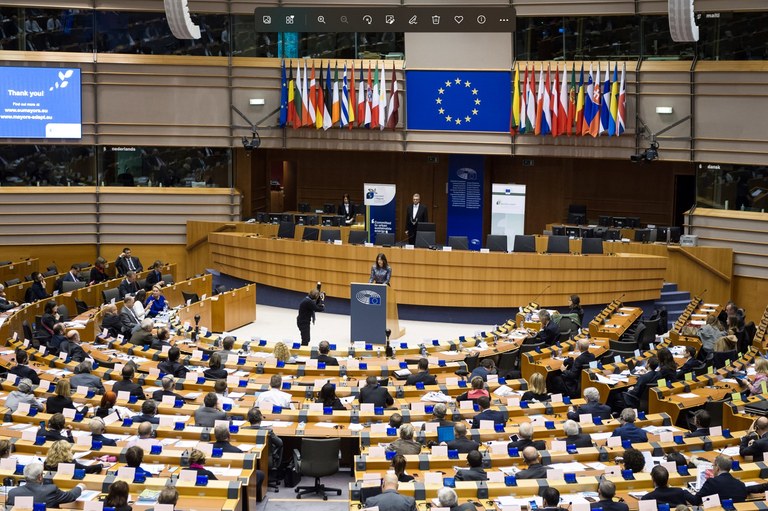MEP Jytte Guteland: another Swedish climate champion
After eight years as an MEP and chief negotiator for EU’s climate legislation, Social Democrat Jytte Guteland is ready to leave the European Parliament to run for a seat in the Swedish one.
“It has been a lot of fun to work with climate legislation and emission trading, but I now feel the need to do something else. I want to be closer to my political party and carry on working on climate issues at home. I also want to bring a little bit of the EU back with me and link it to my work there. I gain from both sides," says Jytte Guteland.
Jytte Guteland is 43 and a former leader of the Swedish Social Democratic Youth League. Her Twitter bio says ”Environmentally committed, feminist with a weakness for cross-country skiing and animals”.
She became an MEP in 2014 with three main issues on her political agenda – the environment and climate, democracy, plus employment and social issues. Just as she prepares to leave the European Parliament, the Swedish broadsheet Dagens Nyheter has called her the Social Democrats’ most successful MEP.
She has also been nominated for “The MEP 2022 Awards”, to be held in Brussels on 29 June. The prize has been awarded 17 times before to MEPs who have been judged to have reached exceptional political goals within the EU. There are various categories and Jytte Guteland has been nominated for “Energy, science and research”.
She spent the latest parliamentary term as the chief negotiator for the EU’s climate legislation and in 2021 she was named the third most influential climate politician in the EU.
“The ‘MEP 2022 Awards’ nomination is mainly a recognition of my work with the climate legislation,” says Jytte Guteland.
She has worked with a sense of purpose since the start of her first term in order to gain influence on climate legislation.

It can be difficult to find your role in the EU Parliament, where decisions are only made after a winding journey through various committees.
“Anyone who is interested in politics sees the Parliament as a smorgasbord of opportunities to make a change. In the beginning, you want to have a finger in every pie, but you then risk that no one at all sees what it is you want, which makes it hard to gain any influence,” says Jytte Guteland.
Finding a voice in the Parliament
Jytte Guteland decided already during her first term as an MEP not to fall into the trap of exploring all of the possibilities Parliament had to offer and started to prioritise in order to find her voice in climate issues.
She and her colleagues spotted an opportunity to make a change and to provide a voice from a Swedish perspective. During that first term, she and her colleagues sought out every possibility to express their views on the environment committee with the aim of eventually creating legislation for emission trading.
This targeted effort succeeded, and Jytte Guteland was given a mandate to negotiate emission trading for the Socialist and Democrats Group in the EU Parliament.
“After that, we continued prioritising climate issues, seeking out all available reports, and I participated in any climate debate there was. I became the group leader of the environment committee during my parliamentary term and chose to prioritise the climate legislation.”
A second term strengthens the arguments
In Jytte Guteland’s experience, it can take one term before you as an MEP completely get into your work. You have no influence over when legislation is tabled and since legislation is revised several times, MEPs get the chance to deepen their knowledge.
“You also gain a stronger voice when you can talk about what it was like the last time. It takes one term before you recognise all the cycles, understand what are big and small issues and what the Parliament can and cannot do.”

Working in Strasbourg makes it harder to stay in touch with contacts in Sweden. Here Jytte Guteland is together with former Swedish Prime Minister Ingvar Carlsson at the Almedalen political week, the year before she was elected an MEP.
Being politically engaged in Sweden means working closer with her own party while being a politician on an EU level. As an MEP it is hard – near impossible even – to regularly take part in the party’s weekly meeting, and Jytte Guteland has been missing this.
The pandemic has brought some changes, however. Hybrid meetings have become more common, and have stayed in place even as restrictions have been lifted. Today it is easier to participate remotely, and Jytte Guteland is now taking part in many meetings in Sweden that previously would have been impossible to attend.
“This has made it easier to have a voice at home in Sweden. I think the same thing goes for my Nordic colleagues, especially those from Finland and Sweden who live quite far from home. We have always suffered from being geographically distant.”
MEPs from the EU’s outer borders often serve shorter periods in the European Parliament. Jytte Guteland hopes this will change if digital meetings become more common.
“You gain more influence the longer you spend there, so it is good for democracy to serve longer periods – but not too long, of course,” she says.
All conversations start with the war in Ukraine
As we talk over Zoom, it has been nearly three weeks since Russia’s invasion of Ukraine. During the EU Parliament’s February session in Strasbourg, there was anger and distress over Russia’s war in Ukraine.
But there was also agreement and pride over being able to make rapid and major decisions, like the temporary protection directive and a range of sanctions against Russia and its oligarchs. Jytte Guteland confirms that atmosphere, even though she was not physically present during that particular session.
“Everyone is shocked and every conversation starts with talking about what the war means. Things have been depressing for a while with the 2015 refugee crisis, Brexit and then the pandemic. We were not prepared for something worse to come along.
“It even felt like things had improved a bit politically when Biden became President in the USA and some of Trump’s populism could be pushed back. Then it turned out that in the shadows, Putin had been preparing for this. It is a horrible and brutal awakening,” says Jytte Guteland.
EU lawmaking continues despite crises
But the EU has also become accustomed to crises and lawmaking has carried on regardless – even now. Despite Putin spending years trying to destabilise the EU, the block’s reactions have shown that he has failed, points out Jytte Guteland.
“The EU has been very good at coming together during these weeks and has acted forcefully with sanctions, condemnations and setting out the ambition to reduce dependency on Russian fossil energy. And even if it is hard to make Putin back down, it is good that the EU stays determined. When the EU apparatus continues its legislative work and stops pumping money into Russia to cut funding for his war chest, that is also a way of acting against Putin.”
She is a strong proponent of making Europe independent from Russian gas and oil. She sees a clear link between the climate and security policy.
“We know that the climate and security are linked in several ways. We see it clearly now when we know that Russian energy exports and therefore EU imports have financed Russia’s war machine. But we also see that global warming has forced people in developing countries to emigrate. This is because a warmer climate means they can no longer cultivate their land, but rising sea levels and extreme weather are also forcing people to flee,” says Jytte Guteland in a video posted on Twitter.
The safety of a family
When she leaves the EU Parliament, she will bring with her the experiences from her climate work and the knowledge and contacts from her parliamentary work.

I EU-parlamentet sitter inte parlamentarikerna landvis, utan i förhållande till vilken partigrupp de tillhör.
“Despite all the crises – consider the changes to the EU’s role in climate politics during these years. Although I and others want to see more, the EU is one of the largest regional powers in the world for the climate and I am glad I have been able to help drive this issue,” says Jytte Guteland.
She is also happy to have had the chance to learn what EU cooperation entails and that there is an organisation that can solve issues that transcend borders. The symbolism of all the member states’ flags side by side has deepened. It means belonging to a European family. And that is important, believes Jytte Guteland. Now more than ever.
“We look beyond national borders and support each other. Before I started working here, things were more theoretical. But now I see this work up close, from the highest political level down to the association level, and it is great. The EU is better than its reputation, although its reputation has improved in later years.”
She paints an everyday image of the Parliament where the different party groups are spread around, united by their party allegiances, not their nationalities. Colleagues from different countries cooperate on ideas but they also become friends.
“In times of war and geopolitical unrest, it feels safe to belong to a family where we are united in party groups by ideas and a shared sense of direction. This has become very obvious and clear, we stick together and our intentions are peaceful. That is needed when the Russian bear has awoken.”
 Follow us on Facebook
Follow us on Facebook
